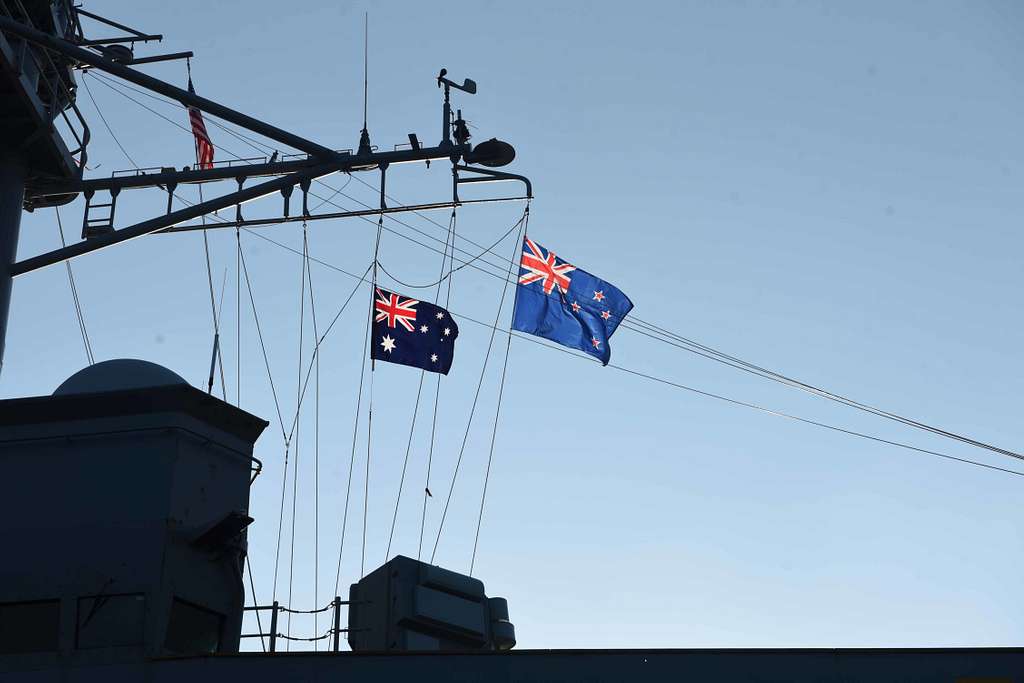This work by Allan Behm shares its locus with other works that deal with the Australian-US alliance; it is marked by a certain unrelenting, biting anxiety.
It is an anxiety discussed in Allan Gyngell’s Fear of Abandonment (2017); it features as the gulping concerns examined in Alan Renouf’s The Frightened Country (1979). To this can be added the lingering sense of dependency so well described by Coral Bell in Dependent Ally (1984). Instructive here is noting Behm’s establishment pedigree. Before becoming the Director of International and Security Affairs at the Australia Institute, he held stints as First Assistant Secretary in the Department of Defence and advisory roles for the current Foreign Minister, Penny Wong, among others.
In The Odd Couple, the author offers generous lashings of anxiety in an appealing, splashy, and readable style. And the focus, from the outset, is the purported instability of the United States and the implications for Australia. Australia’s great strategic risk was “the political and social collapse” of its closest ally. The China threat was hardly as pressing as “the threat of America’s political and social collapse”. The demise of the US would be something Australia would struggle to recover from. With a pessimist’s relish, Behm writes how, “We are now emotionally glued to our new protector, our deep insecurity incarnated in a way that our dependency on Britain never was. Our creation of the ANZUS myth, affording as it does a security vision of the sentimental Anzac myth, has provided us with a faith-based strategic platform that subsumes Australia’s security interests within America’s. When ‘interchangeability’ replaces ‘interoperability’, insecurity morphs into subservience”.
Fascinatingly, the book offers a checklist of the US imperium’s disasters and failings that should suggest detachment rather than prolonged attachment, a search for an annulment rather than the need for extensive marriage counselling. (The use of human relationship analogies in this work can grate.) The bloody misadventure in Vietnam saw the destruction of trust in the accountability of the imperium’s officials, “surely one of the fundamental causes of America’s fundamental malaise.” The interventions in Afghanistan and Iraq were also “strategic disasters”. His assessment of the domestic front is dire: “There are emerging signs that America’s democracy is being devoured from within.” The country is convulsed by ideological division and heated political partisanship. It is structurally misogynist, with President Donald Trump as its foremost representative. He takes the advice of Bruce Stokes to heart, quoting him: Supporters of ‘US stature and influence in the world must engage in strengthening American democracy at home.”
Despite the somewhat dark mood, Behm sketches some parallels between US and Australian history – both settler societies violently disposed to and dispossessing of the indigenous population, both prone to continental insecurity. These comparative attempts are interesting though uneven. Both societies adhere to the rule of law, though Australia conspicuously lacks a bill of rights. The author then veers into areas of cultural flirtation, considering, for instance, what children in the US and Australia “read and heard”, finding “literary values” fairly similar on both sides of the Pacific. Presumably, the intended meaning of these exercises is to promote the view that similar histories point to common ground that could be reflected in a more constructive alliance.
In being constructive, then, time should be spent on diplomatic pursuits. Military adventurism should be avoided in favour of more peaceful objects: economic, cultural, and educational. If economic, they should not take the form of the foolish Australia-United States Free Trade agreement cheered on by Prime Minister John Howard, one that served to blunt Australian policy while disproportionately favouring US companies. Along the way, multilateral efforts were stymied. Australia could also do worse than developing its lobbying presence in the salient centres of power and influence, having the ear of essential lawmakers in the way Israel and Taiwan do.
To that end, Behm still insists, rather normatively, that “America and Australia need each other for their own success, and the global community needs both for its success.” They merely “need to find different ways to achieve different outcomes.” He worries, furthermore, that Australia risks becoming “Nietzsche’s Last Man – anaesthetic, apathetic, bereft of agency”. This is unduly pessimistic, returning Australia to a seemingly inescapable orbit of dependency. Throughout the work, the lines of the cage are drawn: Australian anxiety, an eight-decade-long dependency; the refusal to contemplate a world of greater independence from US policy makers. “Without America, Australia would be alone, adrift on its continent in a region that it does not understand and with which it has no affinity.”
Behm, at stages, hints at channelling Harold Macmillan’s famous assessment of Britain’s role in an age dominated by the US: as wise Greeks advising a buoyant, vigorous, vulgar Roman imperium. Australia, however, is hardly a fitting candidate, being a middle power reliant rather than autonomously wise, more a follower than a leading voice. Behm even uses the term employed by Clinton Fernandes on the issue of sub-imperial power, then errs in assuming that such a status entitles Australia to a particular influence. Australia is hardly an able Jeeves to a clueless, bumbling Wooster, the former all-wise and capable of getting his employer out of scrapes and bother. Most of the time, those in Canberra have been more than capable of getting as much into the mess as their planners in Washington.
With the advent of the trilateral security pact of AUKUS, which Behm neglects to delve into significantly, Australia has confirmed its subservience and subordination to US power, an essential prerequisite for future wars and containment of China. Willing vassals are rarely listened to, losing the respect not merely of adversaries but of the powers they serve.
This is a review of Allan Behm”s The Odd Couple: The Australia-America Relationship (Upswell, 2024). ISBN: 9780645247992
Dr. Binoy Kampmark was a Commonwealth Scholar at Selwyn College, Cambridge. He currently lectures at RMIT University. You can reach him via email at bkampmark@gmail.com
This article is published under Creative Commons License and may be republished with attribution.





